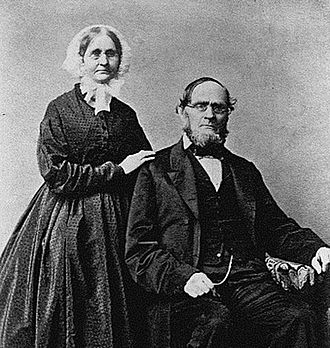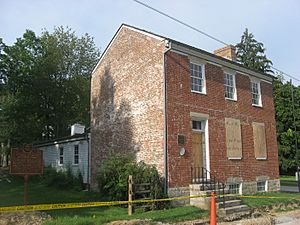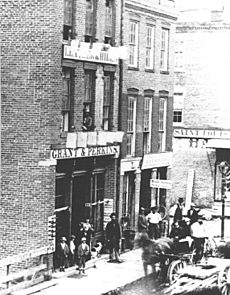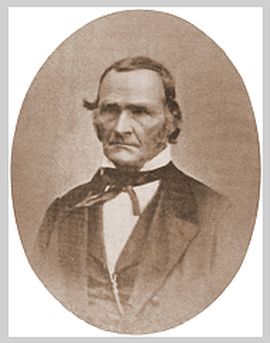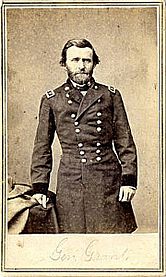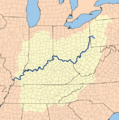Jesse Root Grant facts for kids
Quick facts for kids
Jesse Root Grant
|
|
|---|---|
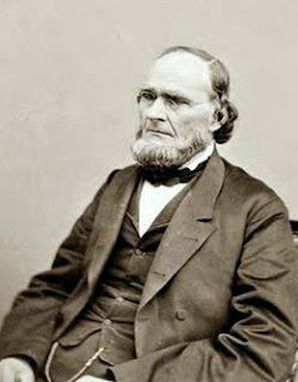
Grant in 1870
|
|
| Mayor of Bethel, Ohio | |
| In office 1851–1855 |
|
| Preceded by | None (position created) |
| Succeeded by | A. Carr |
| Mayor of Georgetown, Ohio | |
| In office 1837–1839 |
|
| Preceded by | George K. Snyder |
| Succeeded by | J. T. Smiley |
| Personal details | |
| Born | January 23, 1794 Greensburg, Pennsylvania |
| Died | June 29, 1873 (aged 79) Covington, Kentucky |
| Nationality | American |
| Political party | Whig |
| Spouse | Hannah Simpson Grant |
| Children | 6 |
| Occupation |
|
| Known for | Father of Ulysses S. Grant Editorialist Abolitionist |
| Signature | |
Jesse Root Grant (January 23, 1794 – June 29, 1873) was an American farmer, tanner, and successful leather merchant. He owned businesses in several states. Jesse is most famous as the father of Ulysses S. Grant, who later became a famous general and President. Jesse was the one who first introduced Ulysses to military life at West Point.
Jesse was born in Greensburg, Pennsylvania, and was one of seven children. He was a self-made man, meaning he started with nothing and worked hard to become wealthy. When Jesse was five, his family moved to the Ohio River Valley in Ohio. His father couldn't support all his children. So, Jesse was sent to work as an apprentice on farms and in tanneries from a young age.
Jesse married Hannah Simpson Grant. They had six children, three boys and three girls. Ulysses was their oldest child. Because Jesse grew up poor and had to work early, he always encouraged his children to get an education and work hard. He was very outspoken and had strong opinions about politics. He was also very proud of his son, often calling him "my Ulysses."
Jesse worked for Owen Brown, who was the father of the famous John Brown. This experience made Jesse strongly against slavery. He started as a supporter of Andrew Jackson, but later changed his mind because of his anti-slavery views. He wrote many articles supporting the end of slavery. Jesse also got involved in local politics. He was elected mayor in Georgetown and later in Bethel, both in Ohio.
During the American Civil War, Jesse and some business partners tried to buy cotton from war zones. He asked his son, General Ulysses S. Grant, to help them get special permission. Jesse was there when Ulysses was sworn in as President. After that, he often visited the White House. He spent his last years in Covington, Kentucky. We know a lot about Ulysses Grant's early life from letters between him and his father, and from other information about Jesse's background and businesses.
Contents
Jesse Grant's Family History
Jesse's family came from England. His ancestor, Matthew Grant, and his wife traveled from Plymouth, England, in 1630. They were part of the Puritan movement. These Puritans left England to escape religious persecution. After a long journey, they arrived in the Massachusetts Bay Colony. They later settled in Windsor, Connecticut. Matthew Grant was a respected member of his community. He worked as a surveyor and the town clerk.
Later generations of the Grant family moved west. They settled in Pennsylvania, Ohio, and Kentucky. Jesse's grandfather, Noah Grant, and his brother Solomon, fought and died in the French and Indian War. Jesse's father, also named Noah, fought in the American Revolution. He was even at the Battle of Bunker Hill and became a captain.
Jesse's Early Life and Education
Jesse's father, Noah Grant, had two children with his first wife, Anna Richardson. Anna died in 1787. On March 4, 1792, Noah married Rachael Kelly in Greensburg, Pennsylvania. Rachael became Jesse's mother. Jesse was born on January 23, 1794. He was named after Jesse Root, a chief justice from Connecticut.
In 1799, when Jesse was five, his family moved to East Liverpool, Ohio. In 1804, they moved again to Deerfield, Ohio. Jesse's mother died in Deerfield in 1805 when he was nine.
Since his father had little money, Jesse was sent to work for different families. From ages 11 to 14, he worked on farms in Ohio. He didn't get a formal education as a child. Instead, he learned to read and write and gained business skills through his apprenticeships. Because of his own experience, Jesse made sure his sons would get a good education.
In 1808, Jesse's father arranged for him to work for Judge George Tod in Youngstown, Ohio. Jesse was 14. He lived with his older sister, Susan, and worked for the judge for four years. The Tod family treated Jesse and Susan like their own children. Jesse went to school for three months a year for two years. He even played with the judge's son, David Tod, who later became Governor of Ohio. Jesse learned to read and write and became interested in politics. A year after he started working for the judge, Jesse's father died. This left Jesse an orphan and his family very poor.
In 1812, at age 16, Jesse moved to Maysville, Kentucky. He worked for his half-brother Peter in a tannery. There, he learned how to tan leather and make leather goods. After finishing his training, he moved back to Deerfield, Ohio, in 1815. He started his own tannery with very little money, but he worked hard.
Around 1814, Jesse also worked at a tannery in Ravenna, Ohio. This tannery was owned by Owen Brown, the father of John Brown. Owen Brown was a strong speaker against slavery. Jesse often listened to him and became a supporter of the anti-slavery cause. During this time, Jesse lived with John Brown and learned about his ideas. Jesse later described John Brown as a good person but someone who took his beliefs to extremes.
In 1817, Jesse bought a large tannery in Ravenna. He sold a lot of his leather to a merchant in Point Pleasant, which would later become his home. Jesse saved about $1500. In 1819, at age 25, Jesse became very sick with malaria. He lost most of his savings because he couldn't work. In 1820, he moved to Maysville, Kentucky, to recover. After getting better, he returned to Ohio and the tannery business.
Family and Community Life
Jesse Grant had a large family living in Ohio and Kentucky. In 1820, he worked briefly at a tannery in Bethel, Ohio. Later that year, he moved to Point Pleasant on the Ohio River. He became a foreman at a new tannery. There, he met Hannah Simpson, who would become his wife.
On June 24, 1821, Jesse Grant, then 27, married Hannah Simpson. They settled in Point Pleasant and had six children. Their first son, Hiram Ulysses Grant, was born on April 27, 1822. Their second son, Samuel Simpson, was born in 1825 and became a successful merchant. They also had three daughters: Clara B. (born 1828), Virginia Paine (born 1832), and Mary Frances (born 1839). Their third son, Orvil Lynchomb, was born in 1835.
By October 1823, Jesse had saved enough money to start his own tannery in Georgetown. He moved his family there. He bought a lot and built a two-story brick house. This is where Ulysses and his siblings grew up for the next sixteen years. Jesse also set up his tannery nearby. He managed his business and also farmed some land. His business was so successful that he paid off his property deed within a year. As his family grew, Jesse added more rooms to their house.
Raising Ulysses Grant
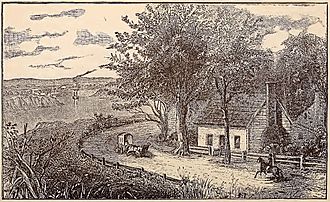
Less than a year after Jesse and Hannah married, their first son, Hiram Ulysses Grant, was born. Naming the first son was a big deal in the Grant family. Everyone had their favorite names. Weeks after the baby was born, Jesse and Hannah still hadn't chosen a name. Finally, the family gathered to decide. They put names in a hat. Hannah's youngest sister drew the name 'Ulysses'. Jesse also wanted to honor the Simpson family, so he decided his son's full name would be Hiram Ulysses Grant. However, Jesse always called his son Ulysses, often saying "my Ulysses." Historians agree that Hannah and Jesse were very proud of their children.
Jesse sent his oldest son, Hiram Ulysses, to a local one-room school in Georgetown. He later sent him to boarding schools in Maysville, Kentucky, and Ripley, Ohio. However, Jesse was disappointed because these schools didn't seem to help Ulysses as much as he hoped.
Jesse wanted Ulysses to work in his tannery, but Ulysses didn't like it. So, Jesse gave him other jobs. Ulysses would drive wagons full of bark and leather goods to and from the tannery. Ulysses was very good with horses. Jesse often sent him on business trips, transporting goods and people. For example, he would send Ulysses on a 40-mile trip to Cincinnati.
Jesse was very proud of Ulysses. But as Ulysses grew up, their relationship sometimes had challenges. In 1838, Jesse enrolled Ulysses in John Rankin's academy. Jesse always wanted his sons to have a good education. Without Ulysses knowing, Jesse arranged for him to be nominated for the U.S. military academy at West Point.
Jesse asked his old friend, Thomas L. Hamer, a prominent lawyer, to nominate Ulysses. Jesse had previously disagreed with Hamer about politics. But Hamer honored Jesse's request. When Hamer sent the nomination, he accidentally wrote "Ulysses S. Grant". This became Ulysses' formal name for the rest of his life.
Ulysses didn't want to go to West Point at first. He didn't appreciate his father's efforts. But after talking, Jesse convinced him. Ulysses saw it as a chance to see the world and become successful. He left for New York on May 15, 1839. In 1847, Jesse sold his Georgetown home.
In 1854, Ulysses was stationed in California at Fort Humboldt. He had been away from his family for two years and wanted to go home. He decided to resign from the army. Jesse was shocked and thought Ulysses was making a big mistake. He tried to get Congress to order Ulysses home or give him leave, but his request was denied. This was another example of Jesse trying to influence his son's life.
Church and Beliefs
Jesse believed education and church were equally important. He and Hannah were Methodists. They taught their children to live a good life and observe the Sabbath day. They didn't play cards or dance, and they didn't allow their children to do so. There was no Methodist church on the Ohio frontier, so they helped start one in Georgetown in 1827. Jesse became a leader in the church. He often welcomed Methodist ministers into his home.
Political Involvement
When Jesse wasn't working, he spent time writing. He was often outspoken about slavery and politics. In 1830, Jesse became a Master in the Masonic Lodge. He wrote about politics and social issues for an anti-slavery newspaper called The Castigator. Its editor, David Ammen, was close with abolitionist John Rankin.
Jesse first supported the Democrats and Andrew Jackson. He ran for mayor of Georgetown in 1830 and for the state legislature in 1832, but he lost both times. He defended Jackson's actions against the Second Bank of the United States. However, in 1832, Jesse changed his mind and supported the Bank. This change upset his friendship with Thomas L. Hamer. Jesse then left the Democrats and joined the Whig Party. He supported Henry Clay's American System, which included a central bank and tariffs.
Jesse was elected as the Whig mayor of Georgetown, Ohio, serving from 1837 to 1839. Before and during the Civil War, he supported Abraham Lincoln. He was very active politically and spoke out against slavery and states leaving the Union. He wrote many articles about these issues in Northern newspapers.
Moving to Bethel and Galena
In 1841, Jesse moved back to Bethel. He bought a house and opened another tannery. That same year, Ulysses visited him during a summer break from West Point. Jesse knew Ulysses loved horses, so he gave him a wild horse to train.
After living in Bethel for ten years, Jesse was elected the town's first mayor in 1851. He served for four years. Then, Jesse moved to Covington, Kentucky, and opened another leather store.
On August 22, 1848, Jesse's son Ulysses married Julia Dent in St. Louis. Jesse, who was strongly against slavery, did not attend the wedding. This was because Julia's father owned slaves. Even though he didn't go to the wedding, Jesse and Hannah welcomed Julia into their family later that month in Bethel.
In August 1853, Ulysses was sent to Fort Humboldt on the west coast. He had problems with his commanding officer. Ulysses was given a choice: resign or face a court martial. He resigned and returned home to his family. Jesse was disappointed. He tried to get Ulysses reinstated in the army, but his appeal was denied.
Later, Jesse started a new leather goods store in Galena, Illinois. He hoped his three sons would take over the business so he could retire. The store sold harnesses, saddles, and other leather items. By 1860, Jesse owned the entire business. He passed control to his sons, Simpson, Orvil, and soon, Ulysses. After leaving the army and trying other businesses, Ulysses asked his father for help. He started working as a clerk at the Galena store.
Before the Civil War, Jesse's leather store became a place for political discussions. Jesse and his sons, Simpson and Orvil, were strong Republicans. Ulysses had supported the Democrats. But the coming war made these differences less important. When news of the attack on Fort Sumter reached Galena, Ulysses re-enlisted in the Army. He answered President Lincoln's call for volunteers.
Ulysses was the only person in town with professional military training. He was chosen to lead a meeting about recruiting soldiers. When Ulysses was given command of the 21st Illinois Volunteer Infantry Regiment, Jesse was disappointed. He felt Ulysses' talents would be better used commanding regular army troops. Ulysses wrote back, explaining he was more concerned about the war than his career.
Civil War Years
During the American Civil War, Jesse lived in Covington, Kentucky. Kentucky remained neutral during the war. Jesse's son Simpson died in 1861. Ulysses brought his children to stay with Jesse, believing they would be safer there.
Jesse followed Ulysses' successes as he became a general and led major campaigns. After the Battle of Shiloh, newspapers reported many casualties. Jesse defended his son, General Ulysses S. Grant, by writing many articles in Cincinnati newspapers. He blamed "five thousand cowards" for the high number of casualties. Jesse's letters became so frequent that General Grant had to tell him to stop writing to the newspapers. Ulysses wrote to his father, "my worst enemy could do me no more injury than you are doing."
During the war, the price of cotton went up. Many people tried to buy and sell cotton in war zones, causing problems for the Union Army. Jesse became involved in cotton speculation. He arrived at General Grant's headquarters with two business partners. They wanted General Grant to help them get permits to buy cotton. General Grant was angry because they were trying to use his influence. He had already heard about other merchants causing problems. Jesse and his partners were told to leave the area. This incident was embarrassing for Grant. It also showed how his father sometimes caused him problems.
After the war, on February 6, 1866, President Andrew Johnson nominated Jesse to be Postmaster in Covington, Kentucky. President Ulysses Grant nominated him for another term in 1870.
Jesse's businesses were very successful. He was worth more than $100,000. He wanted to give most of his money to his children. However, Ulysses didn't want any of it. Instead, Jesse gave $1000 to each of Ulysses' children for their education. The rest of his money went to his other sons and daughters.
Father of a President
When Ulysses S. Grant was sworn in as President on March 4, 1869, Jesse was standing nearby. Chief Justice Salmon P. Chase gave the Oath of Office. Jesse's wife, Hannah, did not come because she disliked public attention. Jesse told reporters that she had been invited but declined. Before the inauguration, Jesse asked about a place to stay for his family. Ulysses told him his extra rooms were promised to friends. Some historians believe Ulysses was not on good terms with his father at this time.
In the last few years of his life, Jesse often visited his son, the President, at the White House. He was always eager to talk to reporters about his son and current events. Jesse died on June 29, 1873, in Covington, Kentucky. This was shortly after President Grant began his second term. His funeral was held at the Union Methodist Episcopal Church in Covington. Jesse was buried at Spring Grove Cemetery, in Cincinnati, Ohio. His wife, Hannah, died ten years later in 1883.
Images for kids
 | Georgia Louise Harris Brown |
 | Julian Abele |
 | Norma Merrick Sklarek |
 | William Sidney Pittman |


